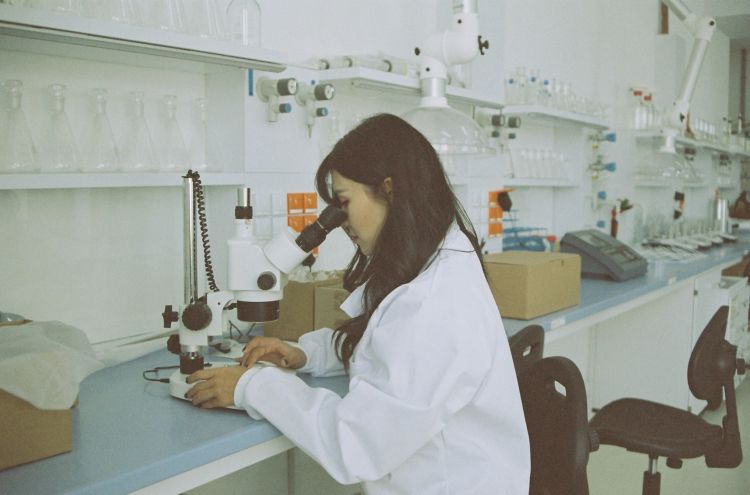Georgia Bio, Nationwide Life Science Leaders Unite To Celebrate Continued Investment In Biotech At New York Stock Exchange
Industry leaders from across the country to ring NYSE closing bell and kick off Biotech Month
FOR IMMEDIATE RELEASE
January 4, 2024, New York, NY – Georgia Bio, the life sciences trade association in Georgia, joined 16 fellow life science trade organizations from across the country yesterday to ring the closing bell at the New York Stock Exchange (NYSE) and kick off national Biotech Month. Maria Thacker-Goethe, immediate past chair for the Council of State Bioscience Associations (CSBA) and President and CEO of Geogia Bio, was among the leaders in attendance at the event, which was held jointly by NewYorkBIO and NYSE to celebrate the link between investment and innovation to best serve patients nationwide.


“I’m honored to ring the closing bell at the New York Stock Exchange with the new CSBA chair, John Conrad of iBio,” said Thacker-Goethe. “Joining my colleagues from across the country underscores that collaboration will help us protect and grow the U.S. innovation ecosystem.”
Georgia is poised to be a hub for life sciences. Georgia Bio’s workforce development program guarantees that the State’s workforce will be well-equipped to meet the demands of the expanding life science community. On the investment side, Georgia Bio along with 6 southeast state associations have partnered with Life Science Nation to launch RESI South in Atlanta on March 25. RESI South will mark the first-even life sciences investor event in the region and will connect start-ups and early-stage investors, an opportunity to showcase the state’s numerous investment opportunities.
“Nationwide collaboration is crucial to driving innovation, finding cures, and ultimately improving health outcomes and quality of life for patients,” added Jennifer Hawks Bland, CEO of NewYorkBIO. “As the worldwide epicenter for the financial sector, New York is uniquely positioned as a nexus for connecting the biosciences industry with the capital that makes groundbreaking research and development possible. NewYorkBIO is grateful to NYSE for this opportunity to welcome our colleagues from across the country to Wall Street, as we bring new meaning to ‘ringing in the new year’ and kick off Biotech Month.”
The event is one of several ongoing collaborations between NewYorkBIO and NYSE, who work together to connect New York’s robust investor community with innovative life science organizations of all types and sizes.
“We are thrilled to host NewYorkBIO and life sciences leaders from across the U.S. at the NYSE to ring our Closing Bell in honor of Biotechnology Month,” said Michael Harris, Global Head of Capital Markets at the New York Stock Exchange. “As we continue to see growth in the life sciences industry, the NYSE looks forward to welcoming many more biotech companies to our community of icons and disruptors.”
Maria Thacker-Goethe joined the below leaders from life science organizations across the country:
- Nick Shipley, Chief Advocacy Officer at BIO
- Michele Oshman, Vice President for External Affairs at BIO
- Chris Molineaux, President & CEO of Life Sciences Pennsylvania
- Debbie Hart, President & CEO of BioNJ
- Jennifer Hawks Bland, CEO, NewYorkBIO
- Elyse Blazevich, President & CEO of Colorado BioScience Association
- Eddie Pauline, President & CEO of Ohio Life Sciences
- Jodie Gillon, President & CEO of BioCT
- John Conrad, President & CEO of Illinois Biotechnology Innovation Organization
- Joni Ekstrum, Executive Director of South Dakota Biotech
- Kelly Schulz, CEO of Maryland Tech Council
- Kendalle Burlin O’Connell, President & CEO of MassBio
- Laura Gunter, President of North Carolina Life Sciences Organization
- Michael Fleming, President of Delaware BioScience Association
- Mike Guerra, President & CEO of California Life Sciences
First introduced by President Clinton in 2000, National Biotechnology Month is an opportunity for the nation’s biotech community to come together to recognize the industry’s achievements on behalf of patients around the world. Falling in January, the recognition month is also an opportunity for industry leaders to look ahead to the advancements of the upcoming year.
To capture the closing bell on January 3, refer to NYSE’s website: nyse.com/bell/calendar
About Georgia Bio
Georgia Bio (GaBio) is the state’s most impactful life sciences membership organization, advocating for the sector and its diverse innovation pipeline. For more than 30 years, GaBio has served its members by supporting companies of all sizes, from early-stage innovators and startups to established industry leaders in the fields of biotechnology, pharmaceuticals, and medical technology. GaBio also works closely with universities, academic and research institutions, the investment community, and other critical partners that promote this vibrant sector. GaBio works to shape public policy, improve access to breakthrough technologies, educate lawmakers, provide member programs, strengthens the workforce pipeline, and advance equity within our ecosystem by championing innovative solutions for some of the most pressing challenges of our times. For more information, visit www.gabio.org.
Contact
Jason Rupp, Georgia Bio, jrupp@gabio.org





